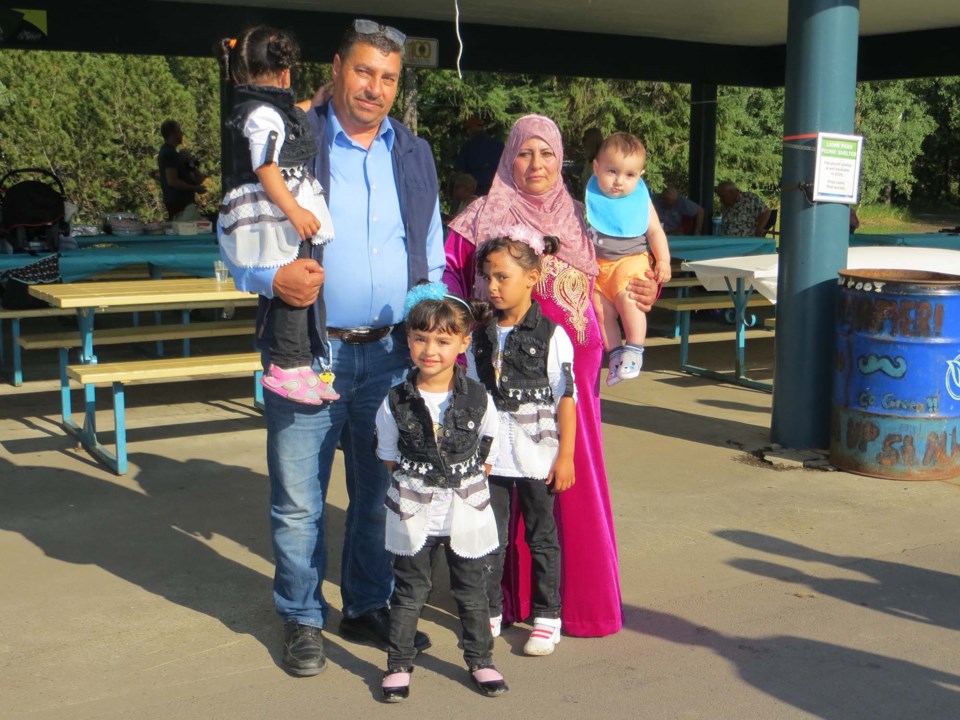“I die every day,” was the heart-wrenching response Jamilla Al Abbas gave when asked about her sons, their wives, and grandchildren who are still living in a Lebanese refugee tenement.
Speaking through St. Albert Arabic interpreter Muna Albduhussain, Jamilla, a Syrian refugee arrived in Edmonton with husband Issam in 2017 under the umbrella of the United Nations High Commissioner for Refugees.
The middle-aged couple, their children, and grandchildren were just a fraction of the nearly five million refugees who escaped to Turkey, Jordan, and Lebanon in 2016.
They were fleeing a conflict that started with peaceful protests in 2011, in which Syrians complained of high unemployment, corruption, and lack of political freedom. President Bashar al-Assad responded with deadly force aiming to crush the dissidents. The rapid escalation of violence resulted in a 10-year war and a humanitarian disaster.
Since arriving in Canada, the couple has worked closely with the Community Refugee Committee of St. Albert to facilitate the arrival of family still living in Beirut. Grateful for the committee’s assistance in raising money, the entire Al Abbas family, immediate and extended, pitched in to prepare a picnic for the committee at Lions Park.
The power of love and sacrifice showed on the couple's faces as they covered two long tables with platters of Syrian chicken, soup, tabbouleh, stuffed zucchini, stuffed grape leaves, rice, baklava, and platters of fruit.
“This means they are very grateful and now we know how grateful they are. We were really impressed they took the initiative, especially knowing they have a limited budget and they wanted to do this,” said Judy Evans, refugee committee chair.
The picnic was a cause for celebration in more ways than one. The Al Abbas family had also contributed $13,000 to the refugee committee resettlement fund. It now totals $60,000. Before the two Beirut-based families receive a go-ahead from the federal government to immigrate, the committee needed $71,000 to assist in the resettling.
Issam said the $13,000 was a loan from family and friends.
“When the boys come, they will start to work and can pay it back,” he said.
The sunny afternoon’s laughter and companionship were uplifting. However, underneath the jovial expressions was worry about the two families across the ocean.
The two sons are Basil and Adnan with wives Yasmine and Mouradi. Each couple has four children. The 12 family members live together in a tiny, crowded two-bedroom apartment. Power is available for only two hours every day and without power there is no running water, said Jamilla.
“They can’t even sleep because of the heat,” she said.
Issam said that, under Lebanese law, refugees are not permitted to work.
“They can’t work. They don’t have an income. They have a credit card from the United Nations, but it is very little.”
In January The Gazette did some rough calculations and the card was equivalent to $507 Canadian at the exchange rate. To supplement the monthly pre-paid UN card, they either borrow money from family, or work in the underground economy taking on meagre jobs whenever possible.
Another challenge the families face is the astronomical spike in food prices since the Beirut port explosion on Aug. 4, 2020. The port was a conduit for much of the country’s imported food.
The explosion occurred when 2,750 tons of ammonium nitrate stored in a warehouse came into contact with fire from a welding torch. The explosion created a crater in the port. It destroyed the warehouse, docks, and massive grain silo. The 120,000-ton-capacity grain silo – the only one in the country – was destroyed, worsening a looming food crisis that continues to affect the economy.
“The prices got higher. They can’t eat meat. Only vegetables and rice,” said Jamilla.
Personal safety is also a concern for many refugees. Issam said his sons and their families are not in any specific danger, but they are not as comfortable as when living in Syria prior to the war.
Jamilla said the men are fearful of being grabbed and conscripted into the Lebanese army. She said the women are safe.
“They try to limit their time out. It’s not like their country where they felt free.”
When Canada closed its borders last year due to COVID-19, it lengthened the stay of every refugee who had been interviewed. Canadian borders are now open. However, Evans said officials will allow refugees who were processed before the COVID shutdown to enter Canada first.
The two Al Abbas families in Beirut are still waiting for interviews with a Canadian visa officer before their applications are reviewed. Evans said no date has been set, however the refugee committee continues to raise funds.
Individuals wishing to donate can send an email to [email protected].


